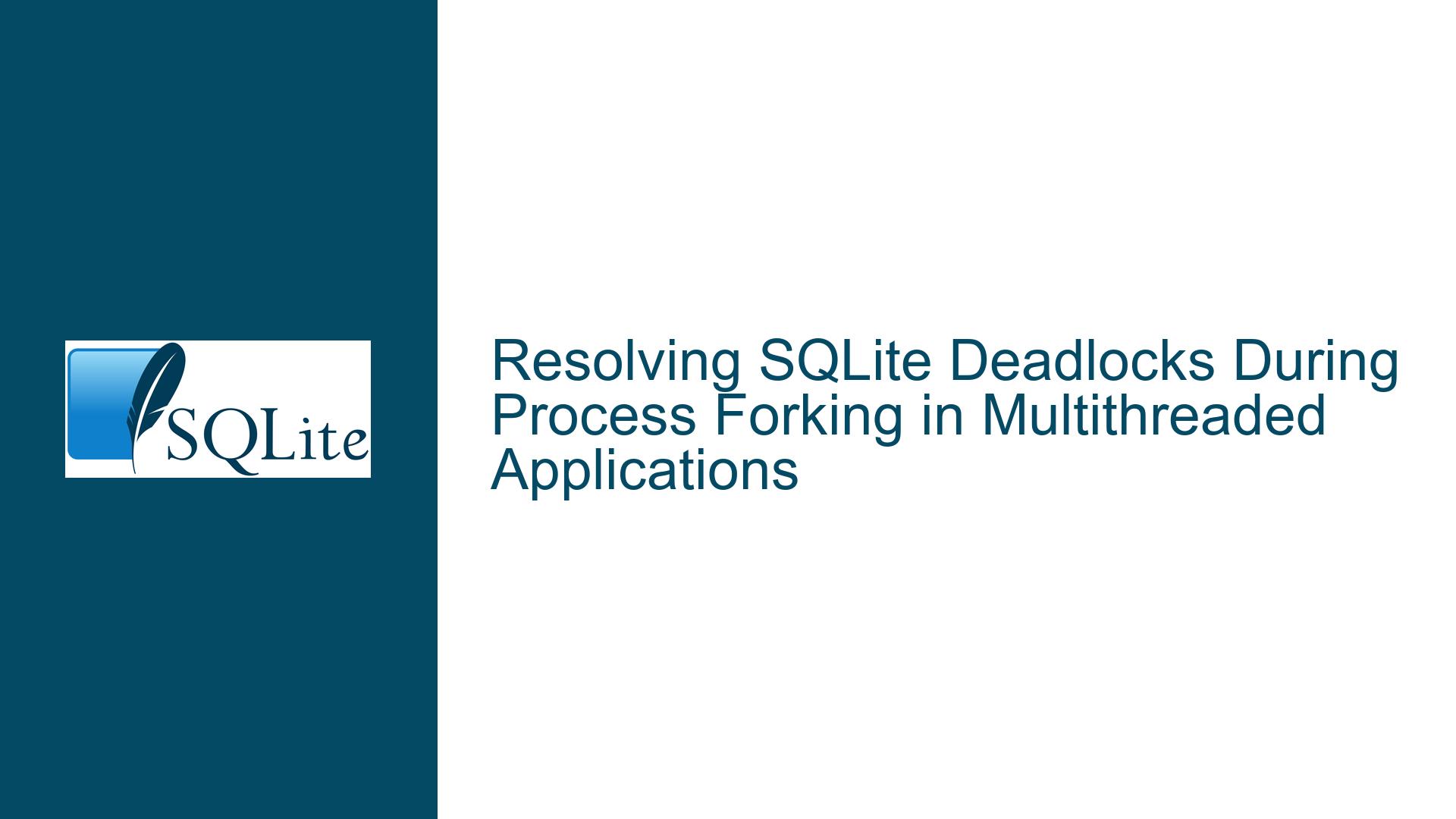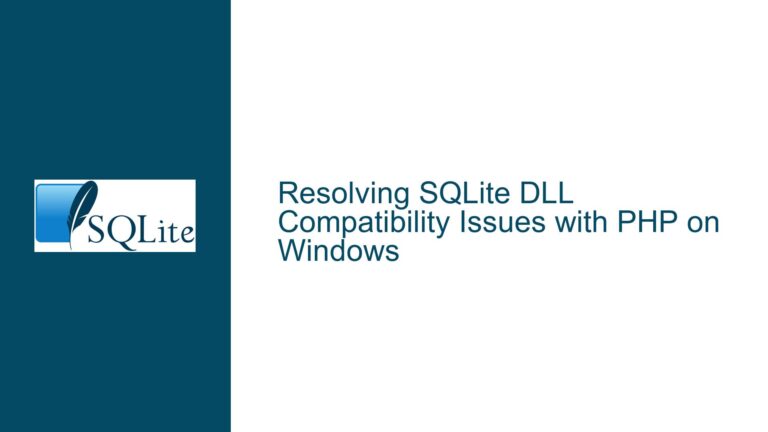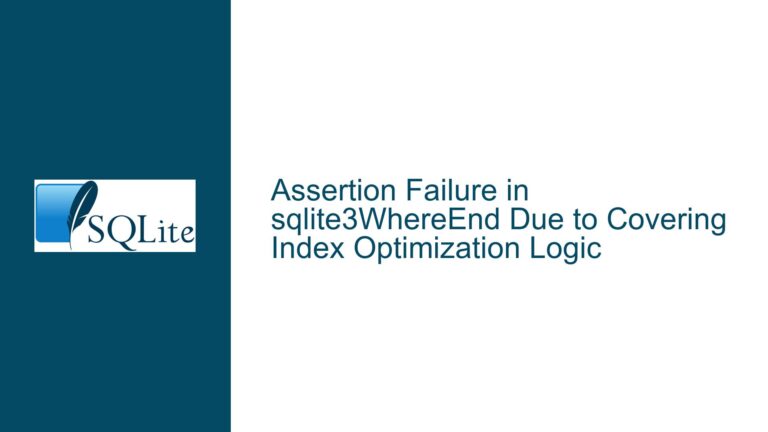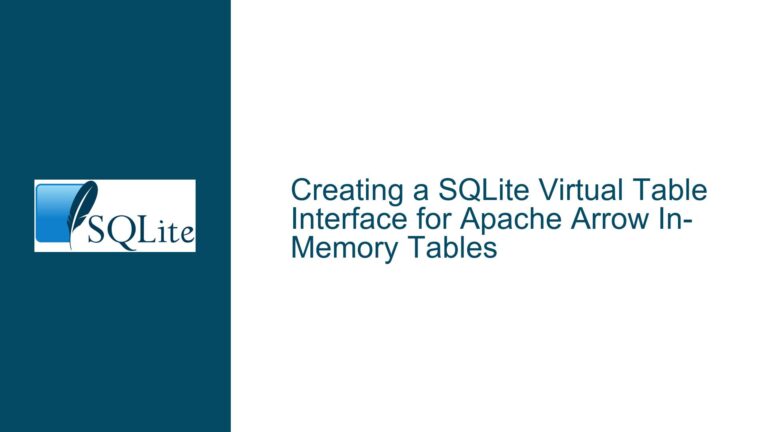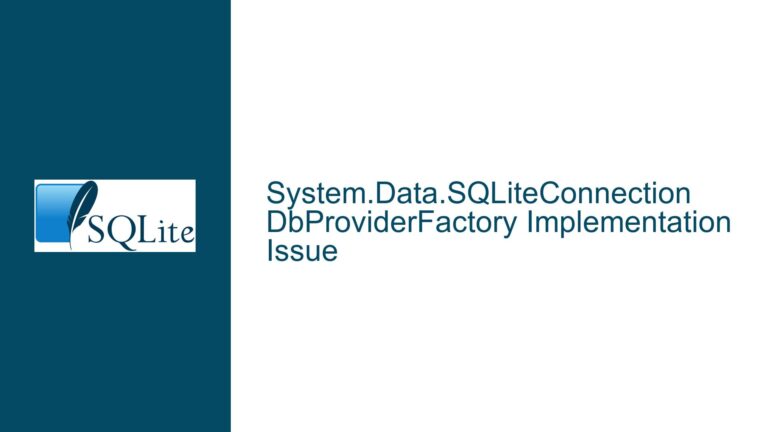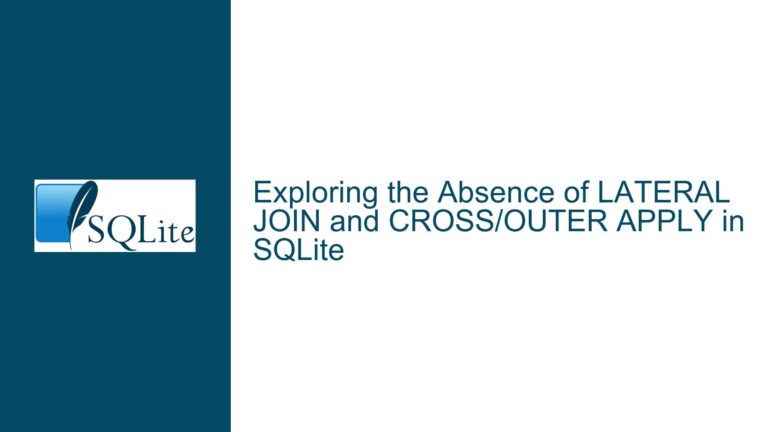Resolving SQLite Deadlocks During Process Forking in Multithreaded Applications
Understanding Deadlocks in SQLite When Forking Multithreaded Processes
Issue Overview
A critical deadlock scenario arises in SQLite when a multithreaded application forks a child process while another thread holds an active transaction. This issue is specific to Unix-like systems (e.g., Linux) where the fork() system call duplicates only the calling thread, leaving other threads’ states unresolved in the child process. If a non-forking thread holds a transaction lock in the parent process, the child process inherits a copy of that lock. However, the child process cannot safely release or modify the lock because the original thread executing the transaction exists only in the parent. This results in a deadlock when the child process attempts to acquire or release SQLite resources tied to the inherited lock.
SQLite relies on internal mutexes to manage concurrency, transactions, and database locks. When a thread begins a transaction, SQLite acquires a reserved or exclusive lock on the database file. These locks are managed via mutexes that coordinate access across threads. In a forked child process, the copied mutexes and locks no longer synchronize correctly because the child process operates in an isolated memory space. The parent and child processes may then compete for the same logical locks, leading to undefined behavior, data corruption, or deadlocks.
The problem is exacerbated by SQLite’s design assumptions: it expects all database connections and associated locks to reside within a single process. Forking violates this assumption by creating a parallel process with duplicated but disconnected resources. The SQLite documentation explicitly warns against sharing database connections across processes or forking with open connections. However, in complex applications, developers may inadvertently trigger this scenario when combining multithreading with process-based parallelism (e.g., prefork servers, task queues).
Root Causes of Fork-Induced Deadlocks in SQLite
1. Inherited Mutexes and Locks in the Child Process
When a thread calls fork(), the child process receives a duplicate of the parent’s memory, including SQLite’s internal mutexes and transaction locks. These mutexes are often implemented as process-local primitives (e.g., pthread_mutex_t on Linux). If a parent thread held a mutex during the fork, the child process inherits a locked mutex with no owning thread to release it. Subsequent operations in the child that require the mutex will block indefinitely.
2. Thread-Isolated Forking in Unix-like Systems
Unlike Solaris, which duplicates all threads during a fork, Linux and other Unix-like systems duplicate only the calling thread. If a non-forking thread in the parent process holds a transaction lock, the child process inherits a locked state with no thread context to manage it. This creates a contradiction: the child process believes a lock is held, but the thread that owns the lock exists only in the parent.
3. SQLite’s Default Mutex Configuration
SQLite uses process-local mutexes by default. These mutexes do not account for changes in process identity after a fork. When a child process starts, it operates with the same mutex state as the parent but lacks the threads or context to resolve inherited locks. This mismatch leads to deadlocks when the child attempts database operations that rely on the inherited mutexes.
4. Transaction State Duplication
Active transactions in the parent process are partially duplicated in the child. SQLite’s transaction state includes in-memory structures (e.g., rollback journals, page caches) that become invalid in the child process. When the child attempts to continue or roll back the transaction, it interacts with stale or corrupted state, triggering deadlocks or database corruption.
Mitigation Strategies and Fixes for Fork-Related SQLite Deadlocks
1. Implementing pthread_atfork Handlers to Reset SQLite State
The pthread_atfork function allows applications to register handlers executed before and after a fork. These handlers can reset SQLite’s internal state in the child process to prevent deadlocks.
Steps to Implement:
- Pre-Fork Handler: Ensure no threads hold SQLite locks or are in active transactions. This may involve global flags or coordination mechanisms to block transactions during forks.
- Post-Fork (Parent): No action required if the parent process resumes normally.
- Post-Fork (Child): Reinitialize SQLite’s mutexes and transaction state. Close or reset all database connections inherited from the parent.
Example Code:
void pre_fork_handler() {
sqlite3_shutdown(); // Terminate all SQLite resources
}
void post_fork_child() {
sqlite3_initialize(); // Reinitialize SQLite in the child
}
// Register handlers during application startup
pthread_atfork(pre_fork_handler, NULL, post_fork_child);
Caveats:
sqlite3_shutdownandsqlite3_initializeare heavyweight operations. Use them only if the application can tolerate temporary unavailability of SQLite.- Active transactions in other threads may be abruptly terminated, requiring application-level recovery.
2. Replacing SQLite Mutexes with Process-Aware Alternatives
Custom mutex implementations can detect forks and enforce process boundaries. For example, mutexes can track the process ID (PID) and assert ownership only in the original process.
Steps to Implement:
- Use
sqlite3_config(SQLITE_CONFIG_MUTEX, &custom_mutex_methods)to override SQLite’s default mutexes. - Implement mutex methods (
xInit,xEnd,xAlloc,xFree,xEnter,xTryEnter,xLeave) that check the PID. If the PID differs from the original (indicating a fork), throw an error or reset the mutex state.
Example PID Check in Mutex:
static void custom_mutex_enter(sqlite3_mutex *mutex) {
if (mutex->owner_pid != getpid()) {
// Handle fork: abort, reset, or error
sqlite3_log(SQLITE_ERROR, "Mutex owned by another process");
abort();
}
// Proceed with lock acquisition
}
Performance Considerations:
- PID checks add minimal overhead (Roger Binns reports <1% in benchmarks).
- Ensure thread safety when accessing PID fields.
3. Enforcing Fork Safety in Application Logic
- Close Connections Before Forking: Ensure all SQLite connections are closed in the parent process before forking. Reopen them in the child if needed.
- Use
forkCorrectly: Restrict fork operations to threads that do not hold SQLite locks. Designate a “fork-safe” thread for spawning child processes. - Leverage Process Isolation: After forking, immediately exec a new binary in the child to replace its memory space, avoiding shared SQLite state.
4. Leveraging SQLite’s Built-in Protections
- Enable
SQLITE_FCNTL_LOCKSTATEto detect and recover from lock inconsistencies. - Use
PRAGMA locking_mode=EXCLUSIVEto minimize lock contention, though this reduces concurrency.
5. Adopting Alternative Concurrency Models
- Replace process-based parallelism (fork) with thread pools or asynchronous I/O.
- Use inter-process communication (IPC) instead of shared database connections.
Conclusion
Forking in multithreaded SQLite applications requires meticulous coordination to avoid deadlocks. Solutions range from low-level mutex customization to high-level architectural changes. The optimal approach depends on the application’s tolerance for downtime, performance requirements, and complexity constraints. Developers must rigorously enforce fork safety to prevent data corruption and ensure transactional integrity.
